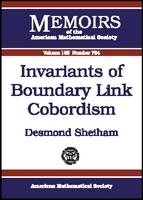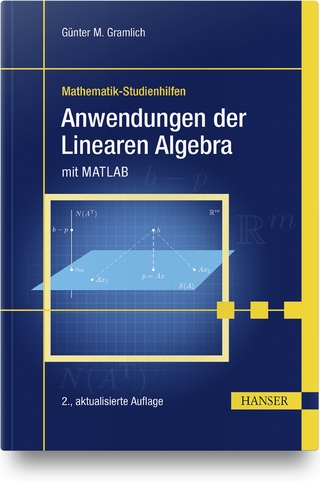
Invariants of Boundary Link Cobordism
Seiten
2003
American Mathematical Society (Verlag)
978-0-8218-3340-7 (ISBN)
American Mathematical Society (Verlag)
978-0-8218-3340-7 (ISBN)
- Titel ist leider vergriffen;
keine Neuauflage - Artikel merken
An $n$-dimensional $/mu$-component boundary link is a codimension $2$ embedding of spheres $L=/sqcup_{/mu}S^n /subset S^{n+2}$ such that there exist $/mu$ disjoint oriented embedded $(n+1)$-manifolds which span the components of $L$. This title proceeds to compute the isomorphism class of $C_{2q-1}(F_/mu)$.
An $n$-dimensional $/mu$-component boundary link is a codimension $2$ embedding of spheres $L=/sqcup_{/mu}S^n /subset S^{n+2}$ such that there exist $/mu$ disjoint oriented embedded $(n+1)$-manifolds which span the components of $L$. An $F_/mu$-link is a boundary link together with a cobordism class of such spanning manifolds. The $F_/mu$-link cobordism group $C_n(F_/mu)$ is known to be trivial when $n$ is even but not finitely generated when $n$ is odd. Our main result is an algorithm to decide whether two odd-dimensional $F_/mu$-links represent the same cobordism class in $C_{2q-1}(F_/mu)$ assuming $q>1$. We proceed to compute the isomorphism class of $C_{2q-1}(F_/mu)$, generalizing Levine's computation of the knot cobordism group $C_{2q-1}(F_1)$.Our starting point is the algebraic formulation of Levine, Ko and Mio who identify $C_{2q-1}(F_/mu)$ with a surgery obstruction group, the Witt group $G^{(-1)^q,/mu}(/Z)$ of $/mu$-component Seifert matrices. We obtain a complete set of torsion-free invariants by passing from integer coefficients to complex coefficients and by applying the algebraic machinery of Quebbemann, Scharlau and Schulte. Signatures correspond to 'algebraically integral' simple self-dual representations of a certain quiver (directed graph with loops). These representations, in turn, correspond to algebraic integers on an infinite disjoint union of real affine varieties. To distinguish torsion classes, we consider rational coefficients in place of complex coefficients, expressing $G^{(-1)^q,/mu}(/mathbb{Q})$ as an infinite direct sum of Witt groups of finite-dimensional division $/mathbb{Q}$-algebras with involution.The Witt group of every such algebra appears as a summand infinitely often. The theory of symmetric and hermitian forms over these division algebras is well-developed. There are five classes of algebras to be considered; complete Witt invariants are available for four classes, those for which the local-global principle applies. An algebra in the fifth class, namely a quaternion algebra with non-standard involution, requires an additional Witt invariant which is defined if all the local invariants vanish.
An $n$-dimensional $/mu$-component boundary link is a codimension $2$ embedding of spheres $L=/sqcup_{/mu}S^n /subset S^{n+2}$ such that there exist $/mu$ disjoint oriented embedded $(n+1)$-manifolds which span the components of $L$. An $F_/mu$-link is a boundary link together with a cobordism class of such spanning manifolds. The $F_/mu$-link cobordism group $C_n(F_/mu)$ is known to be trivial when $n$ is even but not finitely generated when $n$ is odd. Our main result is an algorithm to decide whether two odd-dimensional $F_/mu$-links represent the same cobordism class in $C_{2q-1}(F_/mu)$ assuming $q>1$. We proceed to compute the isomorphism class of $C_{2q-1}(F_/mu)$, generalizing Levine's computation of the knot cobordism group $C_{2q-1}(F_1)$.Our starting point is the algebraic formulation of Levine, Ko and Mio who identify $C_{2q-1}(F_/mu)$ with a surgery obstruction group, the Witt group $G^{(-1)^q,/mu}(/Z)$ of $/mu$-component Seifert matrices. We obtain a complete set of torsion-free invariants by passing from integer coefficients to complex coefficients and by applying the algebraic machinery of Quebbemann, Scharlau and Schulte. Signatures correspond to 'algebraically integral' simple self-dual representations of a certain quiver (directed graph with loops). These representations, in turn, correspond to algebraic integers on an infinite disjoint union of real affine varieties. To distinguish torsion classes, we consider rational coefficients in place of complex coefficients, expressing $G^{(-1)^q,/mu}(/mathbb{Q})$ as an infinite direct sum of Witt groups of finite-dimensional division $/mathbb{Q}$-algebras with involution.The Witt group of every such algebra appears as a summand infinitely often. The theory of symmetric and hermitian forms over these division algebras is well-developed. There are five classes of algebras to be considered; complete Witt invariants are available for four classes, those for which the local-global principle applies. An algebra in the fifth class, namely a quaternion algebra with non-standard involution, requires an additional Witt invariant which is defined if all the local invariants vanish.
Introduction Main results Preliminaries Morita Equivalence Devissage Varieties of representations Generalizing Pfister's theorem Characters Detecting rationality and integrality Representation varieties: Two examples Number theory invariants All division algebras occur Appendix I. Primitive element theorems Appendix II. Hermitian categories Bibliography Index.
| Erscheint lt. Verlag | 1.9.2003 |
|---|---|
| Reihe/Serie | Memoirs of the American Mathematical Society |
| Verlagsort | Providence |
| Sprache | englisch |
| Themenwelt | Mathematik / Informatik ► Mathematik ► Algebra |
| Mathematik / Informatik ► Mathematik ► Geometrie / Topologie | |
| ISBN-10 | 0-8218-3340-5 / 0821833405 |
| ISBN-13 | 978-0-8218-3340-7 / 9780821833407 |
| Zustand | Neuware |
| Haben Sie eine Frage zum Produkt? |
Mehr entdecken
aus dem Bereich
aus dem Bereich


